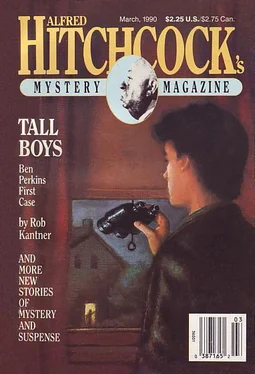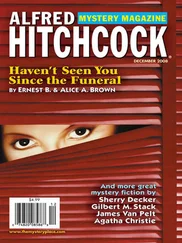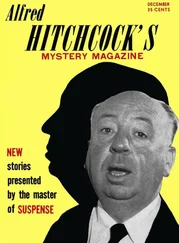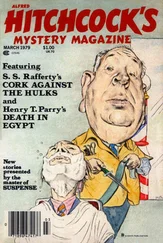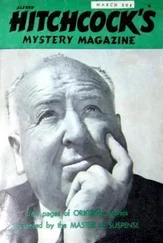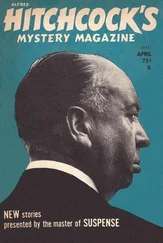Роберт Стивенсон - Alfred Hitchcock’s Mystery Magazine. Vol. 35, No. 3, March 1990
Здесь есть возможность читать онлайн «Роберт Стивенсон - Alfred Hitchcock’s Mystery Magazine. Vol. 35, No. 3, March 1990» весь текст электронной книги совершенно бесплатно (целиком полную версию без сокращений). В некоторых случаях можно слушать аудио, скачать через торрент в формате fb2 и присутствует краткое содержание. Город: New York, Год выпуска: 1990, ISBN: 1990, Издательство: Davis Publications, Жанр: Детектив, на английском языке. Описание произведения, (предисловие) а так же отзывы посетителей доступны на портале библиотеки ЛибКат.
- Название:Alfred Hitchcock’s Mystery Magazine. Vol. 35, No. 3, March 1990
- Автор:
- Издательство:Davis Publications
- Жанр:
- Год:1990
- Город:New York
- ISBN:0002-5224
- Рейтинг книги:4 / 5. Голосов: 1
-
Избранное:Добавить в избранное
- Отзывы:
-
Ваша оценка:
- 80
- 1
- 2
- 3
- 4
- 5
Alfred Hitchcock’s Mystery Magazine. Vol. 35, No. 3, March 1990: краткое содержание, описание и аннотация
Предлагаем к чтению аннотацию, описание, краткое содержание или предисловие (зависит от того, что написал сам автор книги «Alfred Hitchcock’s Mystery Magazine. Vol. 35, No. 3, March 1990»). Если вы не нашли необходимую информацию о книге — напишите в комментариях, мы постараемся отыскать её.
Alfred Hitchcock’s Mystery Magazine. Vol. 35, No. 3, March 1990 — читать онлайн бесплатно полную книгу (весь текст) целиком
Ниже представлен текст книги, разбитый по страницам. Система сохранения места последней прочитанной страницы, позволяет с удобством читать онлайн бесплатно книгу «Alfred Hitchcock’s Mystery Magazine. Vol. 35, No. 3, March 1990», без необходимости каждый раз заново искать на чём Вы остановились. Поставьте закладку, и сможете в любой момент перейти на страницу, на которой закончили чтение.
Интервал:
Закладка:
What could I say to this old man? Even if he relived the killings, I certainly wouldn’t. Changing history was even more preposterous. When the time came, should I humor him? Lie? I followed his gaze to the diminishing light of the front yard. Suddenly I hoped his imagination would allow him to see whatever he wished.
My first impression was puzzlement, my second disbelief. My Chrysler was gone. I experienced that disoriented feeling which comes from witnessing something either tragic or impossible. My car was there a minute ago. Now it wasn’t. The paved driveway was gone. Now a dirt drive led out to a gravelly road. The oak stood slimmer. Under it was parked an ancient dusty black Ford. The car doors were open. Boxes and articles of women’s clothing were visible. Near the car, two people materialized. One was a tall man whose face was more bone than flesh. The hollows of that face caught and held the shadows that fell around him. His eyes, dark as a moonless midnight, were captured by the woman facing him. He was about to help her into the car. I tried to look at Walter, I suppose to assure myself that I wasn’t dreaming, or maybe to prove that I was, but found I was unable to do anything but stare at the unfolding scene. Outside, the two people hesitated, then turned together toward something beyond my vision. Only when the woman turned would I admit who she really was. It was my grandmother, Eleanor. I was amazed by her youth. She had seemed so much older in the family album. Here, she was no more than four or five years older than I. Her golden brown hair was in a loose bun at the nape of her neck. She wore an ankle-length dark brown skirt, and though she stood very erect, she barely reached the shoulder of her companion. Her eyes, when I finally saw them, were haunted and sad.
I didn’t hear the roar Walter had heard, but I felt it. It isn’t possible to describe this, but I “heard” it with a different, foreign, sense. I couldn’t bear to watch the scene he had drawn so painfully clearly, and again I tried to look away. I couldn’t. I was transfixed.
Another man appeared. He was not as tall as the first, but he was broader. His eyes were shocking in their intensity, his mouth a grim, bloodless line. He held an axe. Eleanor’s face now streamed with tears. She stepped in front of the gaunt man, and I saw her mouth forming pleas. From behind, the Indian grasped her shoulders and moved her out of harm’s way. My grandfather, for of course it was he, flew at his enemy like a majestic, crazed eagle. Massive and enraged, he raised the axe. Again Eleanor threw herself in front of the man she so obviously loved. Grandpa, eyes on fire, was now but a few feet away from the man who was thief of all he held dear. The axe stopped in mid-air. The scene froze.
If I should live a century beyond a normal life span, it won’t feel as long as the moments that followed. My chest was constricted. I was sure my heart had stopped. My fingers gripped the table edge. I watched Grandpa’s face soften, and his shoulders sag. I saw the axe fall harmlessly to the ground, and watched as he used the handle to lean upon. I never knew such pity existed as I felt when I witnessed resignation consume him. The Indian didn’t hesitate. He swung Eleanor into the car as another man appeared, racing down the road. The third man stopped at the foot of the drive as the car turned right and drove out of sight. Of course it was a younger version of Walter, the man sitting next to me. He went to my grandfather, who was still standing in the yard, and they stood quietly together as night fell around them.
A highway light appeared and, with it, the outline of my car. I was grateful that a small part of reality had made an appearance.
“He did it,” Walter whispered.
The phone rang. My world was back. I practically knocked it off the hook. “Stintson residence,” I answered in a foreign voice. It was the hospital, of course. Grandpa was dead. I stumbled to his desk and my hands shook as I turned the pages of his diary. It looked the same. Why shouldn’t it? Not once had he said that Eleanor was dead. I turned to the blank pages at the back and grabbed a pen.
“That’s right, boy,” said Walter. “Write it down quick before we forget.”
Forget? Not likely. My problem is the memories crowding out all else. I remember Fleet who taught me to cast and fish in the turbulent Atlantic waters from a small island off the coast of Maine. I remember the small, happy bungalow on that island where I spent many youthful summers in the company of Grandma Eleanor and the rugged, rangy man who adored her. I remember attending his funeral, following so shortly the death of my parents. I had loved him more than the quiet, isolated man I had called Grandpa Tom, whom I now loved and understood more than I ever thought I might. Most of all, I remember, and must continue to remember, that these memories had not existed one half hour before. Two lifetimes had not existed.
I wonder about the impact of these events, and decide that except for the disappearance of some dusty old newspaper copy, there will probably be none.
Walter has memories of his own to contend with. He’s at the sink methodically washing and rinsing the dishes. “Don’t want Eleanor coming back to a mess,” he says.
I remember that Grandpa sent Eleanor a letter, telling her the house is hers, that she must come home as soon as he’s gone. I know now the reason for this. He wants Walter to look after her.
“Write it down, boy,” Walter keeps repeating as my fingers try to fly over the pages. “You and me are the only ones who’ll know what Thomas did. We mustn’t forget.” He’s now washing cabinet doors and counter tops. A thought occurs to me as I look up at him.
“Walter, did you ever marry?”
“Me? No. Keep writing, boy.”
“Don’t worry,” I say. “I’ll write till it’s finished.”
Night Deposit
by Ed Dumonte
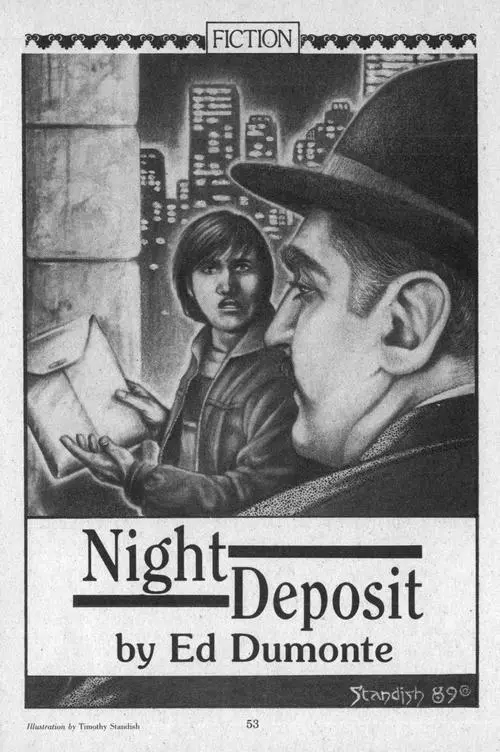
If the United States were a society of classes, Mr. Trumble might well be considered a part of the Aristocratic Class. As it is, Mr. Trumble was a common, ordinary citizen who, properly skinned and dressed from homburg to Guccis, might yield a pelt worth something in excess of three thousand dollars.
If the United States were a society of classes, young Tommy Benson might be considered a part of the Criminal Class. As it is, Tommy was a common, ordinary citizen dressed in chinos, denim, and tennis shoes who happened to be holding an automatic pistol pointed right at the middle of Mr. Trumble’s Savile Row suit.
“I’ll take that nice fat envelope you’re holding, Mr. Trumble,” Tommy said.
This tableau was being performed in front of the night deposit box of the First State Bank at one o’clock in the morning. The night deposit box was a stone pillar with a stainless steel door which Mr. Trumble was holding open, preparing to drop in what was indeed a nice fat envelope.
“Young man, I assure you there is nothing of any interest to you in this envelope,” said he.
“I certainly wouldn’t call you a liar, Mr. Trumble, but I happen to know that today is the day that you make your weekly deposit of the funds taken in by the fancy restaurant you own. I worked there one week as a dishwasher while your regular man was down with the flu. I started watching you then.
“I noticed that at the end of the day you would collect all the receipts and take them back to your office. But you didn’t leave the restaurant. Even after the kitchen help and cleaning people had finished and were going home, you were still in your office. It wasn’t until Sunday that you collected the receipts, went back to your office for a short while, and left the restaurant holding a nice fat envelope very like the one now in your hand.”
Читать дальшеИнтервал:
Закладка:
Похожие книги на «Alfred Hitchcock’s Mystery Magazine. Vol. 35, No. 3, March 1990»
Представляем Вашему вниманию похожие книги на «Alfred Hitchcock’s Mystery Magazine. Vol. 35, No. 3, March 1990» списком для выбора. Мы отобрали схожую по названию и смыслу литературу в надежде предоставить читателям больше вариантов отыскать новые, интересные, ещё непрочитанные произведения.
Обсуждение, отзывы о книге «Alfred Hitchcock’s Mystery Magazine. Vol. 35, No. 3, March 1990» и просто собственные мнения читателей. Оставьте ваши комментарии, напишите, что Вы думаете о произведении, его смысле или главных героях. Укажите что конкретно понравилось, а что нет, и почему Вы так считаете.
